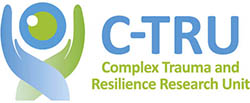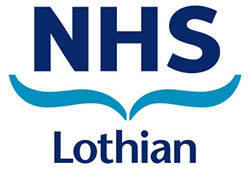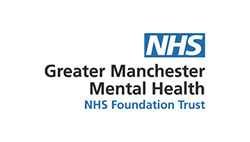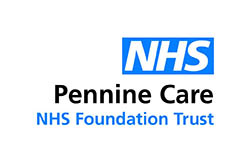The number of young people experiencing online sexual abuse is on the rise. The i-Minds team is developing an app that aims to offer vital tried and tested support to these young people for the first time.
A safe and accessible intervention to support young people who have experienced online sexual abuse is urgently needed.
 We are working with young people across England and in Edinburgh with lived experience of online sexual abuse to develop and test an app.
We are working with young people across England and in Edinburgh with lived experience of online sexual abuse to develop and test an app.
The i-Minds app aims to reduce the risk of further harm and re-victimisation for young people who have experienced online sexual abuse. The app aims to build confidence, resilience, and distress management skills through a technique called mentalisation.
Project background
Online sexual abuse can have serious effects on the mental health and development of young people. There is currently no evidence-based support offered to help the increasing number of young people who have experienced online sexual abuse.
The National Institute for Health and Care Excellence (NICE) has recognised as a research priority the identification of effective interventions for the wellbeing and prevention of further harm for young people who have experienced online sexual abuse.
In partnership with young people and a range of stakeholders, i-Minds is addressing this urgent need through developing an app aimed at improving mentalisation – the ability to understand the thoughts, feelings and intentions in oneself and others.
The uptake and integration of the i-Minds app in health care settings will be maximised through work with NHS mental health services for young people.
The project lasts for 27 months and is being conducted in Greater Manchester and Edinburgh.
Related links:
- ISRCTN registry: i-Minds: a digital intervention for young people exposed to online sexual abuse
- Funding information from the National Institute for Health Research
- Clinical trials information on the U.S. National Library of Medicine
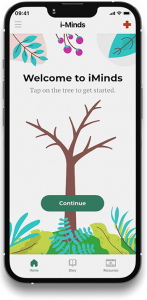 The i-Minds app
The i-Minds app
The i-Minds app focuses on three main areas:
- relationships in the online space;
- emotional and mental health;
- and the impact of trauma.
The app features a multi-media resource section with lots of helpful tips and strategies for taking action, inspiration and soothing, a video library and useful links.
Information for participants
Sexual abuse involves forcing someone to take part in sexual activities, whether that person is aware of what is happening or not. Online sexual abuse of young people is on the rise and has become an important priority for health and social care services.
Online sexual abuse can have serious effects on young people’s development and mental health.
Young people can report this abuse to government agencies and social media companies, but there is little tried and tested support for helpful treatments.
Previous research has shown that a treatment called mentalisation based therapy can be useful for young people. This involves helping you understand your own and other people’s behaviour by making sense of thoughts, feelings and intentions.
Research is needed to find out whether this therapy approach, delivered via an app, helps young people manage the impact of their experiences of online sexual abuse.
How we developed the app
We set up three advisory panels consisting of young people who have experienced online sexual abuse, professionals, and national stakeholders. We regularly consult with these panels to make sure that the work we produce together is relevant and meaningful.
In partnership with our advisory panels, we have developed an app which will be tested in a clinical trial.
We want to create an app that is easy to use, has a positive effect on mental health and well-being and helps young people stay safe on the internet.
We also want the app to be used by NHS services that support young people who have experienced online sexual abuse.
Get involved
There are different ways to get involved in this project including:
- as a participant;
- as a patient and public involvement (PPI) group member;
- or as a referrer.
Find out more about our different groups in the following section. If you are interested in taking part, please email alice.newtonbraithwaite@gmmh.nhs.uk.

Learning from lived experience
Lived experience means that you have lived through something and have gained knowledge and insight about that experience. Involving people with lived experience in research is very important. It ensures that research is carried out by and in collaboration with people, not done to or about them.
This enables research that helps the people it is intended for and empowers those involved. It increases the likelihood of the right changes being made to the way services provide access to and deliver care to people, and in turn, helps ensure people’s needs are met.
Patient and public involvement and engagement
Patient and public involvement and engagement (PPIE) is central to the i-Minds project and we are working with three different PPIE groups which have been fundamental in testing and creating the i-Minds app.
Lived Experience Advisory group (LEAG)
The lived experience advisory group is made up of people aged 18-30 who have personal experience of online sexual abuse.
The group meets every 1-2 months and provides feedback on lots of different aspects of the project.
Parents and Professionals Advisory Group (PPAG)
This group consists of parents and professionals who have experience of working with and/or caring for young people who have experienced online sexual abuse.
This is a diverse group with professionals from lots of different organisations including the Marie Collins Foundation and 42nd Street.
National Stakeholder Advisory Committee (NSAC)
The NSAC is made up of experts working across the third sector, academia, law enforcement and other stakeholder agencies.
You can get further information about patient and public involvement in research at the Involve website.

Our team
Learn more about the people working on the i-Minds project.
Professor Sandra Bucci
 Professor Bucci is an NIHR Research Professor, Professor of Clinical Psychology at The University of Manchester, and a clinical psychologist with a special interest in digital mental health and developing novel psychological treatments for psychosis. She is the Principal Investigator for the i-Minds project.
Professor Bucci is an NIHR Research Professor, Professor of Clinical Psychology at The University of Manchester, and a clinical psychologist with a special interest in digital mental health and developing novel psychological treatments for psychosis. She is the Principal Investigator for the i-Minds project.
Victoria Green
 Victoria is Chief Executive of the Marie Collins Foundation and a qualified social worker who, through the Foundation, works to support the recovery of children from technology-assisted sexual abuse.
Victoria is Chief Executive of the Marie Collins Foundation and a qualified social worker who, through the Foundation, works to support the recovery of children from technology-assisted sexual abuse.
She brings to the project this practice understanding, experience and wisdom, enhancing the voice of the victim and survivor.
Dr Kim Cartwright
Professor Prathiba Chitsabesan
 Professor Chitsabesan is Consultant Child and Adolescent Psychiatrist (Pennine Care NHS Foundation Trust), National Speciality Advisor and Co-chair of the Clinical Reference Group (Children and Young People’s Mental Health Team, NHS England and NHS Improvement) and Visiting Professor at Manchester Metropolitan University.
Professor Chitsabesan is Consultant Child and Adolescent Psychiatrist (Pennine Care NHS Foundation Trust), National Speciality Advisor and Co-chair of the Clinical Reference Group (Children and Young People’s Mental Health Team, NHS England and NHS Improvement) and Visiting Professor at Manchester Metropolitan University.
She leads the Pennine Care recruitment site for the i-Minds project.
Professor Cathy Richards
 Professor Richards is Lead Clinician/Head of Psychology for Child and Adolescent Mental Health Services (CAMHS) at NHS Lothian and Honorary Professor at The University of Edinburgh.
Professor Richards is Lead Clinician/Head of Psychology for Child and Adolescent Mental Health Services (CAMHS) at NHS Lothian and Honorary Professor at The University of Edinburgh.
She is the clinical lead in NHS Lothian for the i-Minds project.
Professor Matthias Schwannauer
 Professor Schwannauer is Head of School for Health and Social Science at The University of Edinburgh and Consultant Clinical Psychologist.
Professor Schwannauer is Head of School for Health and Social Science at The University of Edinburgh and Consultant Clinical Psychologist.
He is the site lead in Edinburgh for the i-Minds project.
Professor John Norrie
 Professor Norrie is Chair of Medical Statistics and Trial Methodology at The University of Edinburgh and Director of the Edinburgh Clinical Trials Unit (ECTU).
Professor Norrie is Chair of Medical Statistics and Trial Methodology at The University of Edinburgh and Director of the Edinburgh Clinical Trials Unit (ECTU).
He is the statistician/methodologist on the i-Minds project.
Dr Filippo Varese
 Dr Varese is a Senior Clinical Lecturer in Psychology and an NIHR Advanced Fellow at The University of Manchester.
Dr Varese is a Senior Clinical Lecturer in Psychology and an NIHR Advanced Fellow at The University of Manchester.
He supports the delivery of the i-Minds project at the Manchester site.
Professor Ethel Quayle
 Professor Quayle is a Clinical Psychologist who, for over 20 years, has researched technology-mediated crimes against children, collaborating internationally with government and non-government agencies in the context of research, policy and practice.
Professor Quayle is a Clinical Psychologist who, for over 20 years, has researched technology-mediated crimes against children, collaborating internationally with government and non-government agencies in the context of research, policy and practice.
She leads the qualitative work on the i-Minds project.
Dr Pauline Whelan
 Dr Whelan is the Digital Health Lead of the Digital Health Software Team at The University of Manchester and is supporting the co-design of the i-Minds app.
Dr Whelan is the Digital Health Lead of the Digital Health Software Team at The University of Manchester and is supporting the co-design of the i-Minds app.
Matthew Machin
 Matthew is Digital Health Technical Lead of the Digital Health Software Team at The University of Manchester.
Matthew is Digital Health Technical Lead of the Digital Health Software Team at The University of Manchester.
Matthew specialises in the application of mobile technologies to healthcare research across a range of health domains including severe mental illness, cancer prevention and rheumatoid arthritis.
For the i-Minds project he leads the development and support of the app and all of the associated software engineering work.
Other research staff
Will Hewins is a Research Assistant for i-Minds based at the University of Edinburgh/NHS Lothian.
Alice Newton-Braithwaite is a Research Assistant based at the Complex Trauma and Resilience Research Unit.
Cindy Chan is a Research Assistant for i-Minds based at Greater Manchester Mental Health NHS Foundation Trust and The University of Manchester.
Felipa Schmidt is a PhD student completing a PhD on technology-facilitated child sexual abuse at The University of Manchester under the supervision of Professor Bucci and Dr Varese.

Contact us
If you are interested in finding out more about taking part in our research, please email alice.newtonbraithwaite@gmmh.nhs.uk.
Follow us on Twitter


